
[SLIDESHOW=40529]COLUMBUS, Ohio (BP) –- Presidents of the Southern Baptist Convention’s seminaries noted key initiatives as well as enrollment gains in their reports to messengers June 16 at the SBC annual meeting in Columbus, Ohio.
This year, all six seminary presidents presented their reports jointly. After the report, each president introduced the next and prayed over him.
Golden Gate
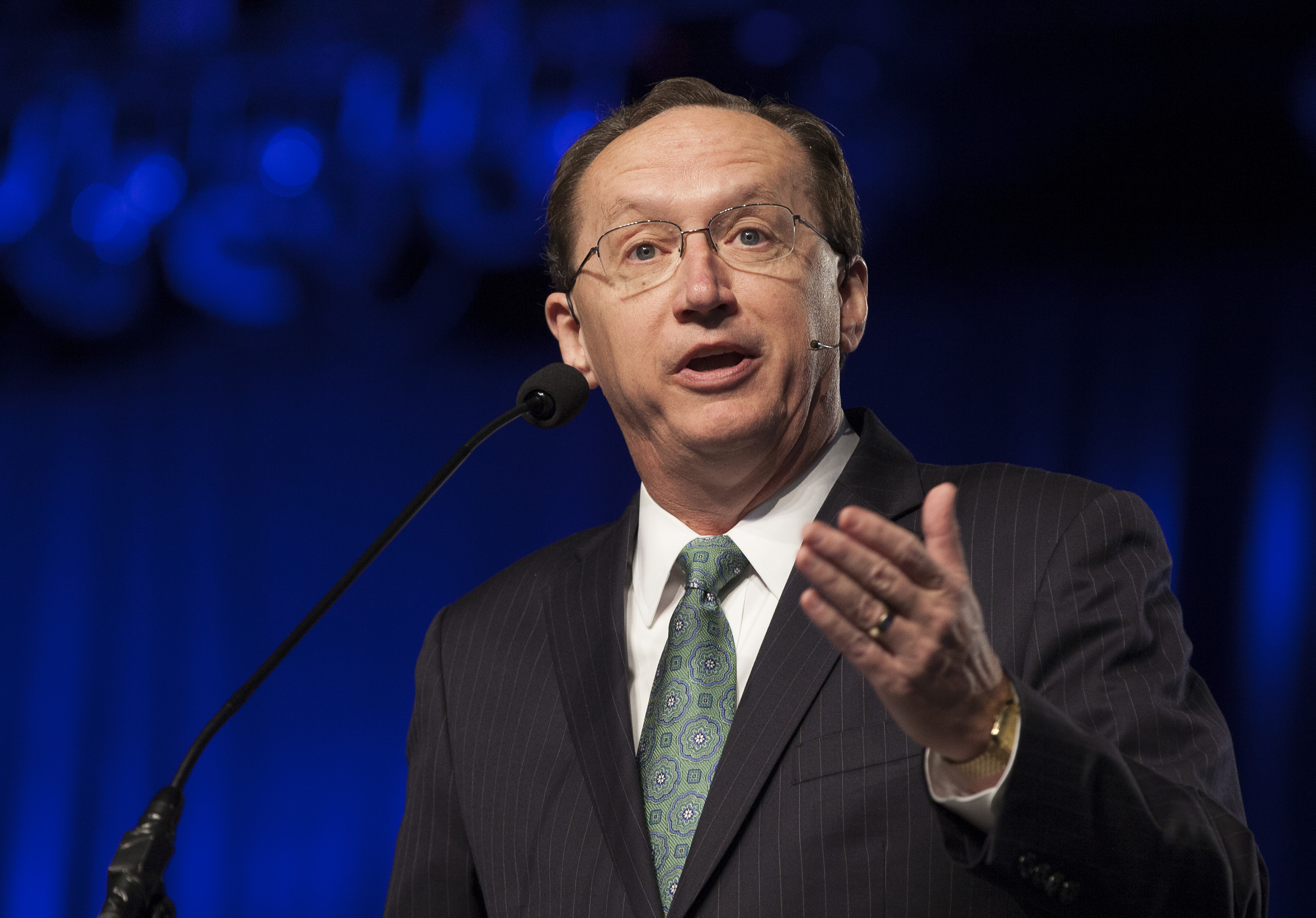 Jeff Iorg, president of Golden Gate Baptist Theological Seminary, told messengers that the move to a new main campus in 2016 will be completed debt-free and with two new facilities to serve as anchor campuses on the West Coast.
Jeff Iorg, president of Golden Gate Baptist Theological Seminary, told messengers that the move to a new main campus in 2016 will be completed debt-free and with two new facilities to serve as anchor campuses on the West Coast.
“The [Southern California] facility in Ontario, Calif., is a state-of-art 21st-century educational center with more than 150,000 square feet of usable space,” Iorg said. Meanwhile, “The [northern California] facility in Fremont, Calif., will serve 250-300 commuter students in the Bay Area as we continue our historic ministry near San Francisco. We are spending about $45 million to complete these facilities debt-free.”
As part of its move to new California campuses, the seminary has requested a name change to Gateway Seminary of the Southern Baptist Convention, which received the first of two votes June 16 toward final approval during the SBC annual meeting next year in St. Louis.
Iorg emphasized that the new facilities’ designs would be mission-specific, devoted to the seminary’s educational programs and equipped to handle the educational delivery demands of the future.
“We are delighted to present these facilities as symbols of the vitality of your seminary in the West,” Iorg told messengers. “We are pleased to confirm we have reserved $40 million from the sale of the Mill Valley property for our permanent endowment.”
Iorg said the move has opened an unprecedented opportunity to “re-imagine seminary for the future.”
“We have endeavored, in response, to seize the opportunity and create a new seminary for the 21st century,” he said.
Iorg said the seminary’s campuses in Phoenix, Denver and the Pacific Northwest will remain operational during the transition process for the California campuses.
God has blessed the transition in four visible ways, Iorg said, noting that: 1) building officials have streamlined the process, which he said was not always the case in California; 2) more than $4.25 million in special gifts has been donated for relocation-related projects; 3) the seminary continues to enroll large numbers of students, even while changing locations; and 4) the seminary is making the move with “remarkable unity.”
“We have had virtually no opposition to the relocation,” Iorg said. “Obviously, many people are saddened by the decision to leave our beautiful Mill Valley property where there are so many significant memories. But across the board — faculty, staff, students, alumni and friends have poured out their support for the decision. We are making this major move without internal division or external attacks. God is blessing us with unity that comes from resolute focus on His mission.”
Midwestern
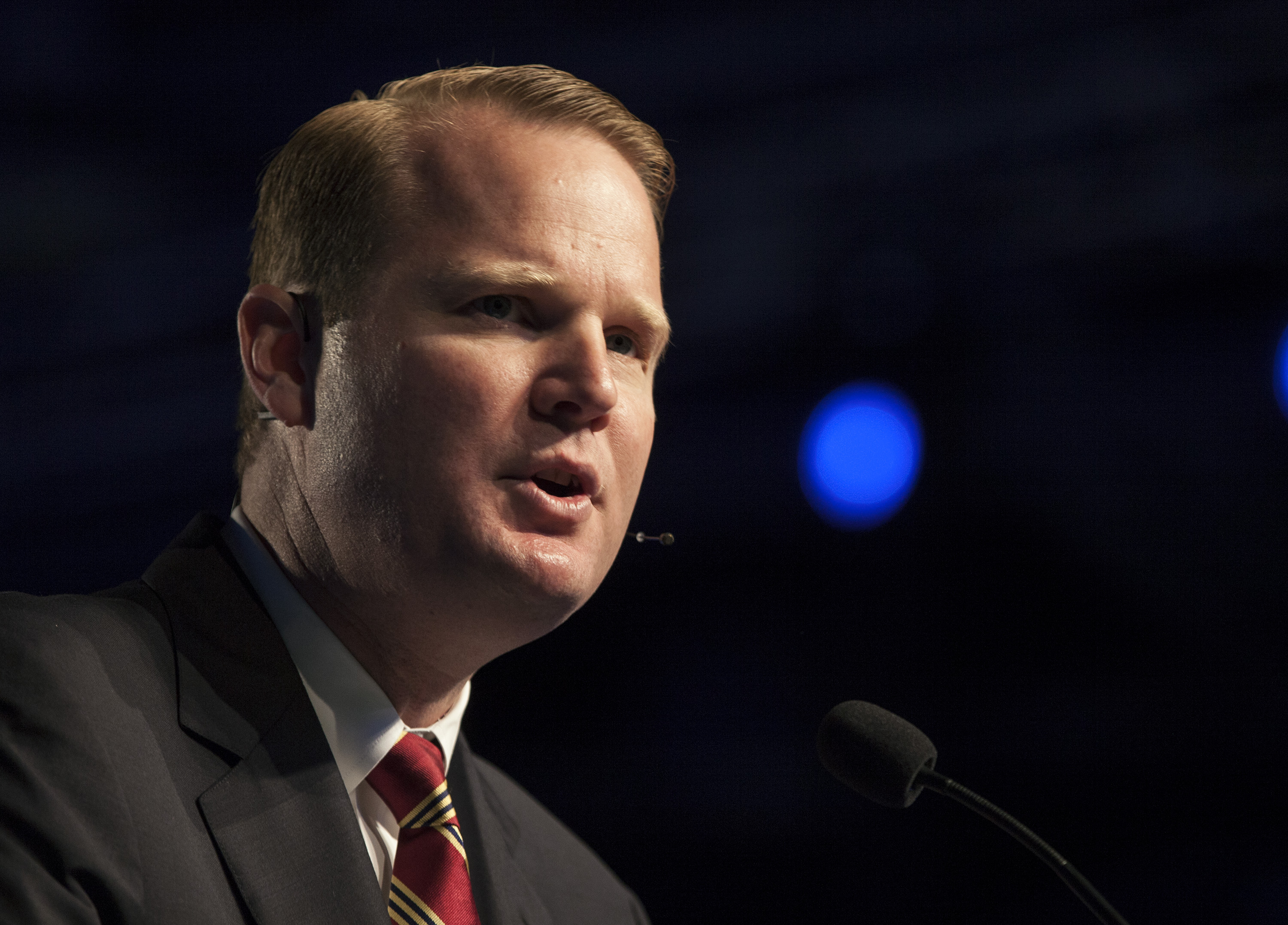 Jason Allen, in his third president’s report since being elected to lead Midwestern Baptist Theological Seminary, called this time in SBC history “a golden era in theological education.”
Jason Allen, in his third president’s report since being elected to lead Midwestern Baptist Theological Seminary, called this time in SBC history “a golden era in theological education.”
“You can be proud of your six seminaries,” Allen said. “Collectively, we are doctrinally sound, Great Commission-focused, and given to serving your churches. As we have done that, God has blessed your seminaries with massive enrollments.”
As part of this success, Allen noted that Midwestern’s story possibly was the most unlikely of all. In spite of past doctrinal challenges and more recent operational challenges, he said the seminary witnessed a year of “unprecedented institutional accomplishment.”
“This past year has been a record one, with virtually every institutional metric showing robust growth and seminary health,” Allen said, noting that a report by the Association of Theological Schools accrediting agency ranked Midwestern as the fastest-growing seminary in North America among schools enrolling at least 500 students.
Allen attributed the explosive growth to Midwestern’s emphasis on existing “for the Church,” a motto the seminary has begun using.
“I told the ATS representative, ‘We serve Southern Baptist churches and we have retooled every aspect of this seminary to equip pastors, ministers and missionaries for the church. And our vision resonates broadly with the constituency we serve — the Southern Baptist Convention,'” Allen said.
The seminary’s determination to exist for the local church is convictional, biblically mandated and denominationally needed, he said.
“Christ promised to build His church, not our seminary,” Allen said. “However, we are confident that as we strengthen His church, He will strengthen us…. Our biblical mandate calls us to train actual, committed servants for the church.”
Allen added that “for the Church” isn’t just a slogan or catchphrase; the philosophy has penetrated all areas of campus.
“‘For the Church’ touches on every aspect of seminary life: the curriculum we teach, the programs we offer, the events we host, the personnel we hire and the community and culture we cultivate,” Allen said, adding that the hiring of Provost Jason Duesing and scholars and authors John Mark Yeats, Christian George and Jared Wilson significantly strengthened the faculty and administration.
Additionally, Allen reported on God’s providence toward Midwestern having financial stability and receiving record contributions toward $3 million in campus construction and renovations concluding this summer. Part of the construction is the Charles Spurgeon Center for Biblical Preaching, which will house the Charles Spurgeon Library that includes more than 6,000 books and artifacts once owned by the renowned Baptist preacher.
“The Spurgeon Library will be more than a museum; it will be an incubator for preachers and preaching,” Allen said. “We believe that the health of the church is linked to the health of the pulpit. Who better than Charles Spurgeon to teach us how to be doctrinally sound, evangelistically faithful, and how to give oneself sacrificially for the church?”
Allen concluded his report with the announcement of a Sept. 28-29 symposium, “SBC & the 21st Century: Reflection, Renewal, and Recommitment.”
“This year, Midwestern Seminary is hosting a historic summit on the future of the SBC,” Allen said. “Al Mohler, Paige Patterson, Ronnie Floyd, Frank Page and many, many other SBC leaders will join me in discussing issues facing Southern Baptists moving forward into the 21st century.” For more information about the symposium, visit www.mbts.edu/events/.
New Orleans
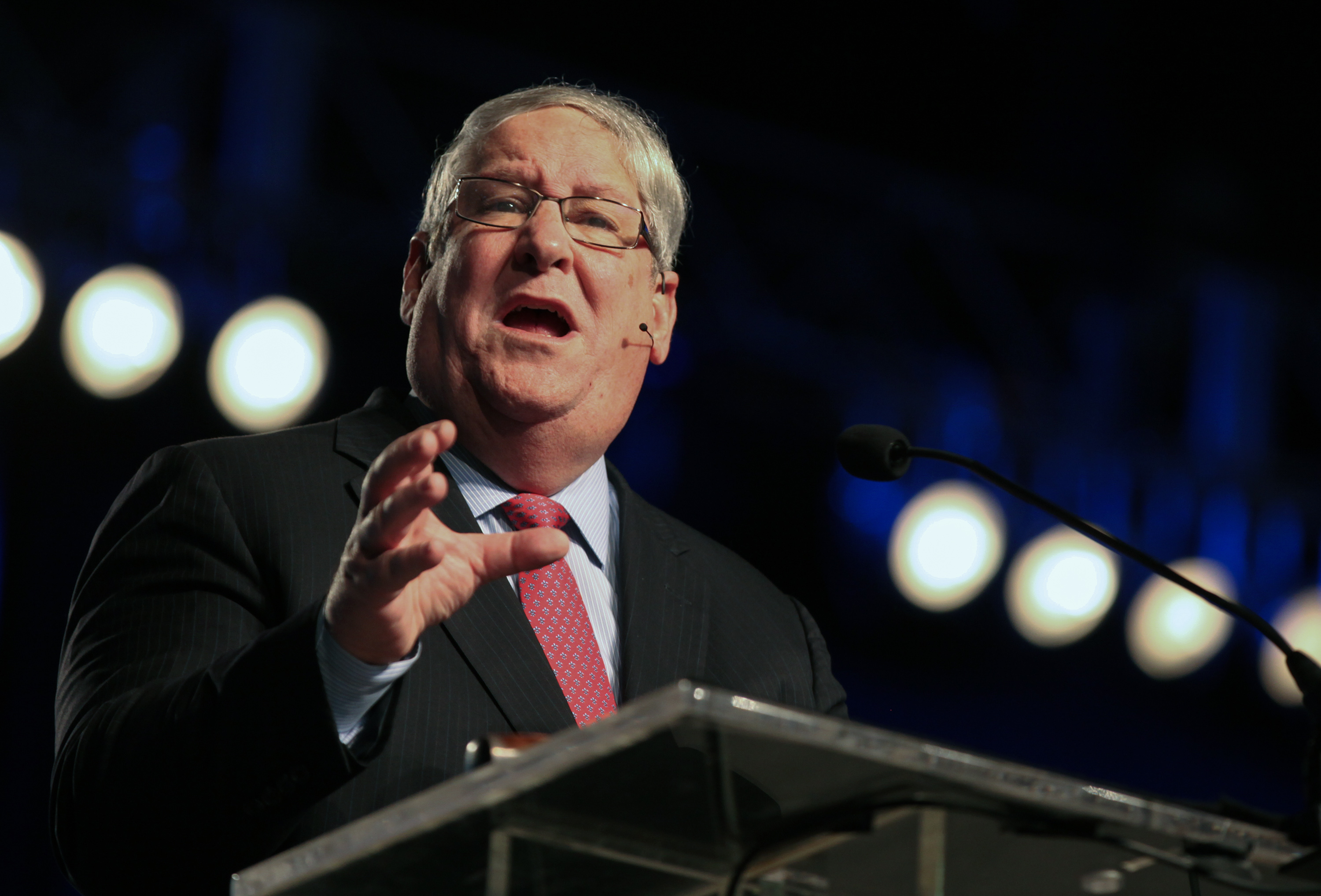 Chuck Kelley, New Orleans Baptist Theological Seminary president, began his report to messengers by quoting from the call of Isaiah recorded in Isaiah 6: “Whom can I send? Who will go for us? And I [Isaiah] said, ‘Here am I, send me.'”
Chuck Kelley, New Orleans Baptist Theological Seminary president, began his report to messengers by quoting from the call of Isaiah recorded in Isaiah 6: “Whom can I send? Who will go for us? And I [Isaiah] said, ‘Here am I, send me.'”
“New Orleans Seminary exists to serve all of those who hear the call Isaiah heard and are answering the call to serve the Lord,” Kelley said.
Accessibility is one key way NOBTS is helping men and women answer God’s call and train for ministry, Kelley said. Initiatives like the seminary’s extensive extension center system and fully-online undergraduate and master’s degrees are extending the NOBTS campus and allowing students to train for ministry without leaving the churches they already serve. Online learning is giving the seminary a truly global reach, Kelley said, making training available to any God-called man or woman in the world who has a computer and an Internet connection.
One of the newest accessibility initiatives at NOBTS is the Entrust Mentoring Community, Kelley said. Entrust allows a student to earn much of his or her degree while ministering in a local church setting. Study is guided by NOBTS professors and enhanced by weekly interaction with local church mentors. Any SBC church in the United States with a willing mentor is a potential Entrust study location, Kelley said.
Kelley said the seminary not only is teaching about ministry but is actively involved in doing ministry. From community Christian counseling in New Orleans to a ministry partnership with a local drug and alcohol recovery ministry and training programs at five state prisons, NOBTS pairs the theoretical scholarship students expect in the classroom with real-world ministry experiences.
The seminary, Kelley said, also is answering God’s call through unusual opportunities like the Caskey Center for Church Excellence. The center, launched with a $10 million gift honoring a small church pastor, offers full-tuition scholarships to bivocational and smaller membership church ministers serving SBC churches in Louisiana and Mississippi.
“[Smaller] churches are the heart and soul of the Southern Baptist Convention,” Kelley said. “Nearly 90 percent of all of our churches have 250 people or less present on a Sunday morning. These are the churches that determine the flow of the Southern Baptist Convention.”
The ministry of the Caskey students during the program’s inaugural year has been remarkable. One key aspect of the Caskey program is the call to weekly, intentional, Gospel witness. As a result, the 194 Caskey students shared the Gospel more than 3,000 times this year and saw more than 400 people come to faith in Christ, Kelley said.
Kelley closed his report with special thanks to the other five SBC seminaries, the SBC entities, the SBC Executive Committee and the convention’s churches for the love and support the seminary received in the devastating wake of Hurricane Katrina. New Orleans will mark the storm’s 10th anniversary on Aug. 29.
“It was as hopeless of a situation as I have ever faced in all of my life,” Kelley said. “We would not have been able to survive without your help, but help you did.
“And now, I am delighted to say that this year we will finish with the largest enrollment in the history of New Orleans Baptist Theological Seminary,” he said. “My word to you is, ‘Don’t quit.’ No matter how hard it is, no matter how impossible your circumstances … our God is able to prevail.”
Southeastern
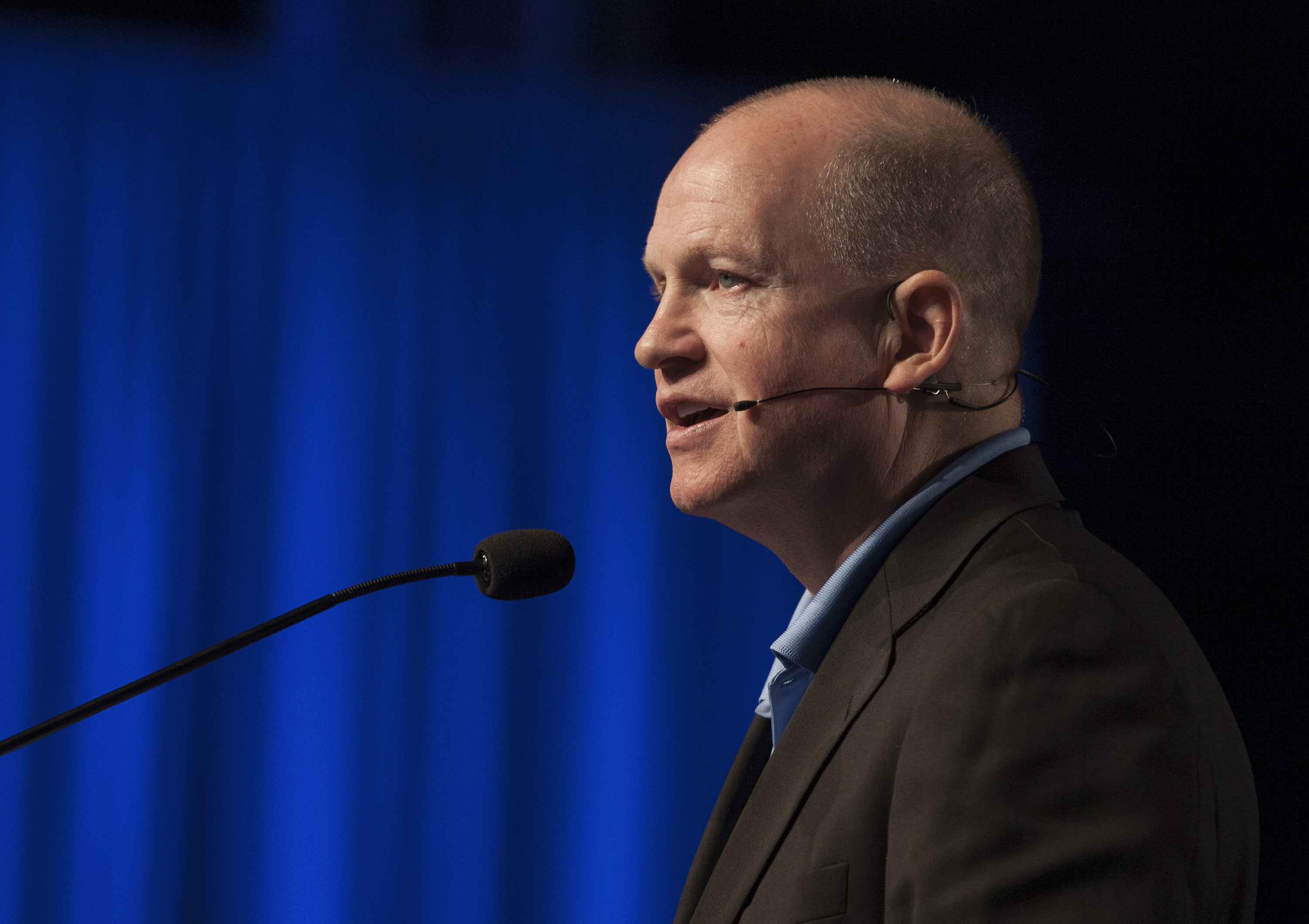 Daniel Akin, president of Southeastern Baptist Theological Seminary, shared how the seminary is training more than 3,400 students to flood the lands of darkness with the Gospel light.
Daniel Akin, president of Southeastern Baptist Theological Seminary, shared how the seminary is training more than 3,400 students to flood the lands of darkness with the Gospel light.
Currently, Southeastern graduates are serving in unreached and underserved areas in North America and around the world as church planters in the Northwest, Midwest and Heartland regions and in 40 countries.
Akin quoted the missionary John Falconer of the 1600s: “I have but one candle of life to burn, and I would rather burn it out in a land filled with darkness than in a land flooded with light.” Akin stated that Southeastern seeks to instill the same heart and passion of Falconer in today’s seminary students.
Southeastern’s Kingdom Diversity Initiative has propelled the non-majority student population at Southeastern to increase nearly 50 percent in the past four years to nearly 14 percent of the total student population.
The seminary would like to see that number continue to grow and build up future leaders of the convention, Akin said. “We hope to see numbers increase so that our seminary, churches and convention look like the church in heaven,” he emphasized. “In God’s grace the nations are coming to us.”
Southeastern’s distance learning program provides theological training to students in 50 countries while its EQUIP internship program has now partnered with more than 300 churches. The seminary’s Global Theological Initiative currently features 15 to 20 international partnerships, with new programs beginning this year in countries such as Cuba, Hong Kong, Brazil and the Ukraine.
“At Southeastern Seminary we take pride in saying it is a dangerous place to come study,” Akin said. “We are going to challenge you to pray the prayer, ‘Why should I stay?'”
Voicing gratitude to the churches of the Southern Baptist Convention, Akin said, “Thank you for making it possible through your prayers and generous giving for Southeastern to have a thumbprint all around the world.”
Southern
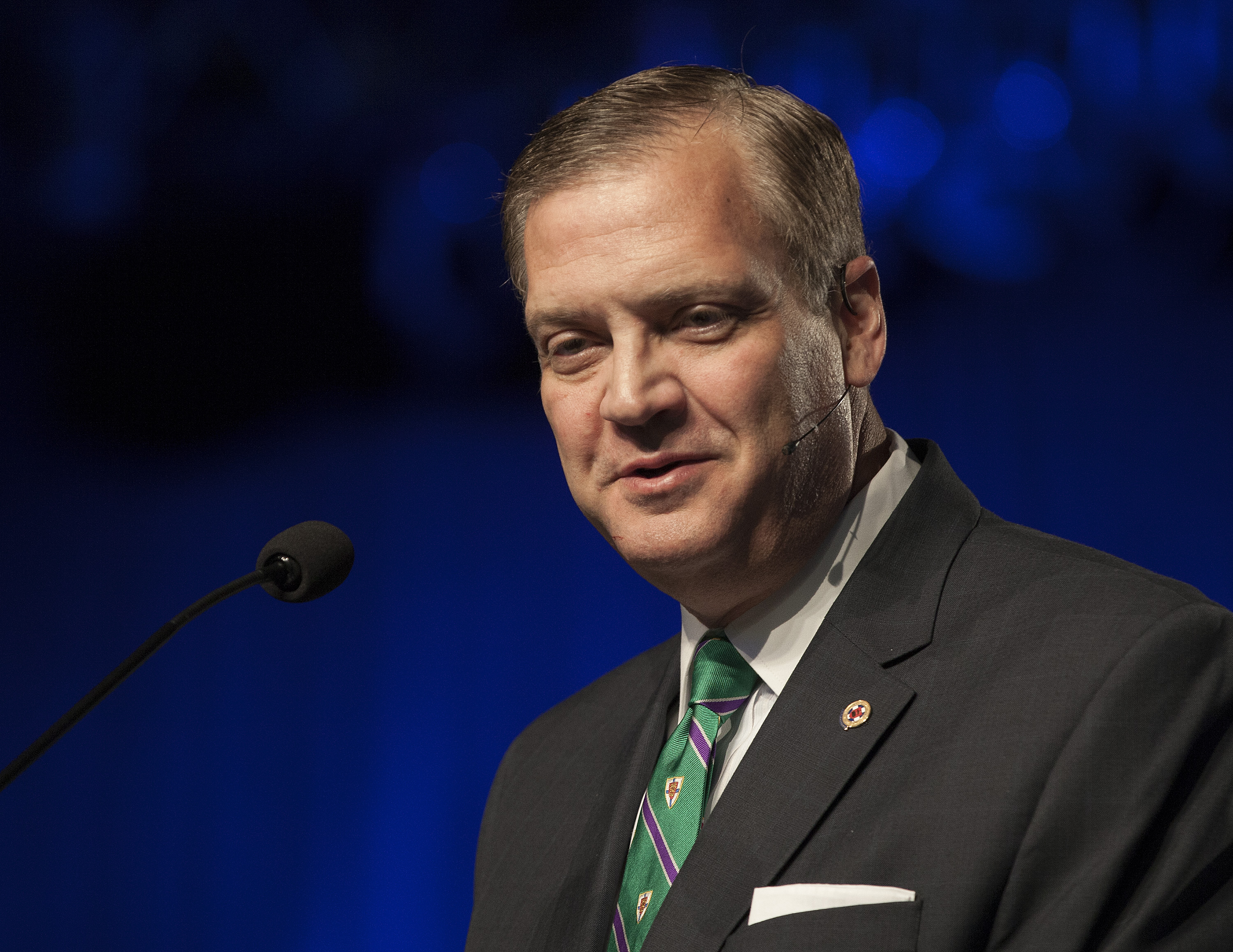 Southern Baptist seminaries are “ground zero” for how churches respond to the rapid moral shift in American culture, said R. Albert Mohler Jr., president of Southern Baptist Theological Seminary, in his June 16 report to messengers at the Southern Baptist Convention annual meeting in Columbus, Ohio.
Southern Baptist seminaries are “ground zero” for how churches respond to the rapid moral shift in American culture, said R. Albert Mohler Jr., president of Southern Baptist Theological Seminary, in his June 16 report to messengers at the Southern Baptist Convention annual meeting in Columbus, Ohio.
“We’re living in a world that’s going to demand more and ever more when it comes to faithfulness on the part of our students and graduates,” Mohler said, speaking about the imminent Supreme Court decision on the legalization of same-sex marriage. “There will be no place to hide. And that just reinforces for us how important what happens on our campuses is, and I say that for all six seminaries. It reminds us at Southern Seminary what’s at stake and why it’s so important.”
Mohler said this is an example of why seminary education is “deadly dangerous” business because theological drift in seminaries affects entire denominations. In the face of such danger, Southern is committed to biblical fidelity, he said, noting that the SBC marks 30 years since the record attendance of the 1985 annual meeting in Dallas during the height of the conservative resurgence. The commitments Southern Baptists make today, he said, will be remembered 30 years into the future.
“I just want you to know our commitment is we’re going to stand firm,” Mohler said. “We’re going to stand in the Gospel, we’re going to stand in the inerrancy of Scripture, we’re going to stand in the faith once for all delivered to the saints, and we’re going to stand with you together.”
Mohler insisted the seminary could not carry out its assignment without the prayer and Cooperative Program gifts of Southern Baptists.
“We are now in a situation where there are more young men studying for the pastorate on Southern Seminary’s campus than there has ever been in one place at one time in the history of the Christian church,” Mohler said. According to the newly published “President’s Report,” nearly 4,792 total students are enrolled at Southern, with 1,952 master of divinity students.
“Just imagine how irritating that is to people who would wish for Christianity to have some very different message than the Gospel of Jesus Christ,” he said. “And they wish for the trajectory of the church in America to be something other than doctrinal fidelity.”
Meanwhile in his report, Mohler said that although Southern is committed to keeping the “gold standard” of face-to-face education as its main task, the seminary’s recent launch of its Global Campus will use technology to reach new fields.
“We can now offer by means of our Global Campus theological education based upon the faith of Southern Baptist churches … to anyone anywhere on the planet any time of day,” Mohler said. More information about Southern’s Global Campus is available at sbts.edu/globalcampus.
Southwestern
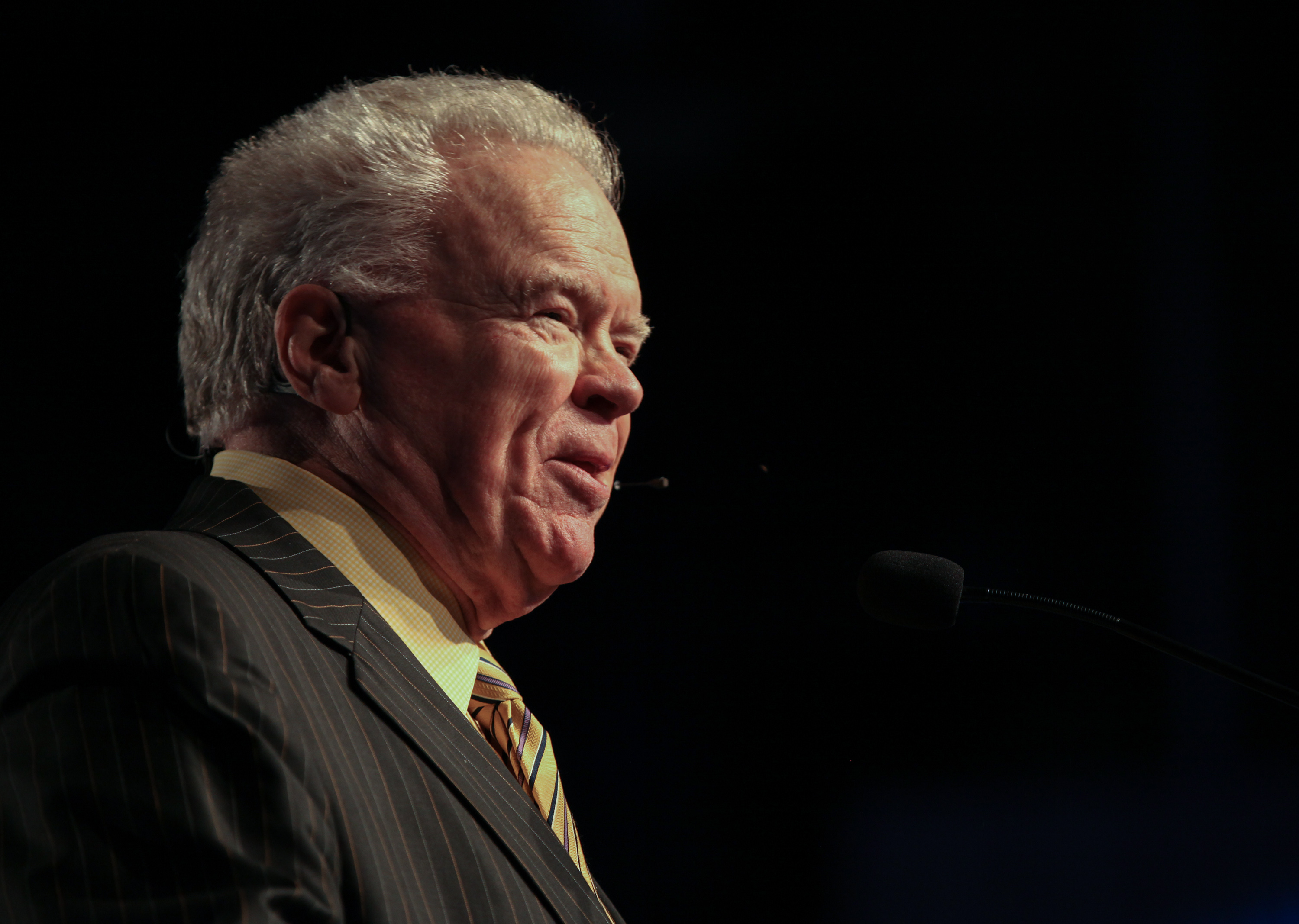 In his report at the annual meeting, Southwestern Baptist Theological Seminary President Paige Patterson addressed the trustee action taken in response to concern at the 2014 meeting for an exception he granted to allow a Muslim student to study archaeology.
In his report at the annual meeting, Southwestern Baptist Theological Seminary President Paige Patterson addressed the trustee action taken in response to concern at the 2014 meeting for an exception he granted to allow a Muslim student to study archaeology.
After careful consideration, trustees modified the bylaws article outlining the composition of the student body to allow a modified criteria for admission for limited special circumstances. The new bylaw language clarifies that trustees must approve any modified criteria for exceptional cases, Patterson said.
Patterson explained that the student no longer attends the seminary due to his life becoming endangered after his name and face were made public last year.
He also noted that the trustee system works and that the board did its job in response to the convention’s concerns.
In addressing other matters, Patterson recounted a conversation with former International Mission Board President Tom Elliff in which Elliff requested that Southwestern adopt an unreached people group. Patterson explained that he wanted a large people group somewhere in the world that is virtually inaccessible and dangerous to get to with no known believers.
Shortly after the conversation, Southwestern adopted the Antandroy people group of nearly 1 million people on the island of Madagascar. A seminary mission team recently returned from the island where they saw nearly 400 professions of faith among the Antandroy people and two New Testament churches on the brink of establishment.
Southwestern will be involved in world missions — wherever needed, Patterson said.
Patterson addressed Global Theological Innovation — an initiative Southwestern developed in order to “tell the story of Christ and train leaders across the world.”
“There are now more than 70 seminaries worldwide that have entered this consortium with us,” Patterson said.
The vision for the initiative is to undergird and strengthen global Baptist theological education — reaching, teaching and equipping the next generation of international theological educators, pastors, missionaries and church leaders, Patterson said. As part of this effort, the global consortium assists seminaries in obtaining library facilities they need and providing more than 100,000 online volumes for each of the participating seminaries free of charge.
Patterson stated that all six Southern Baptist seminaries are involved in missions worldwide and that it is something for which everyone should be grateful to God.
Patterson concluded by asking for prayer for the seminary, students and faculty, that the seminary would stay true to the Word of God, that students would remain “consistent, personal soul-winners” and that faculty members would continue to set good examples.
He asked for prayer that students would “breathe with a strong backbone and conviction to be prophets of God and stand if necessary against the culture, against the president of the U.S., against the Congress, against the Supreme Court — against whomever they must in order to proclaim the unsearchable riches of Christ.”
Patterson additionally expressed gratitude for the prayers, giving and support of the messengers at the convention.
















